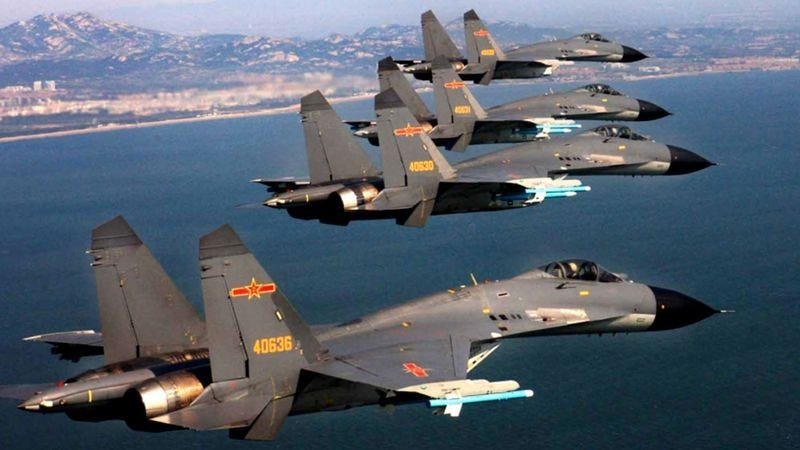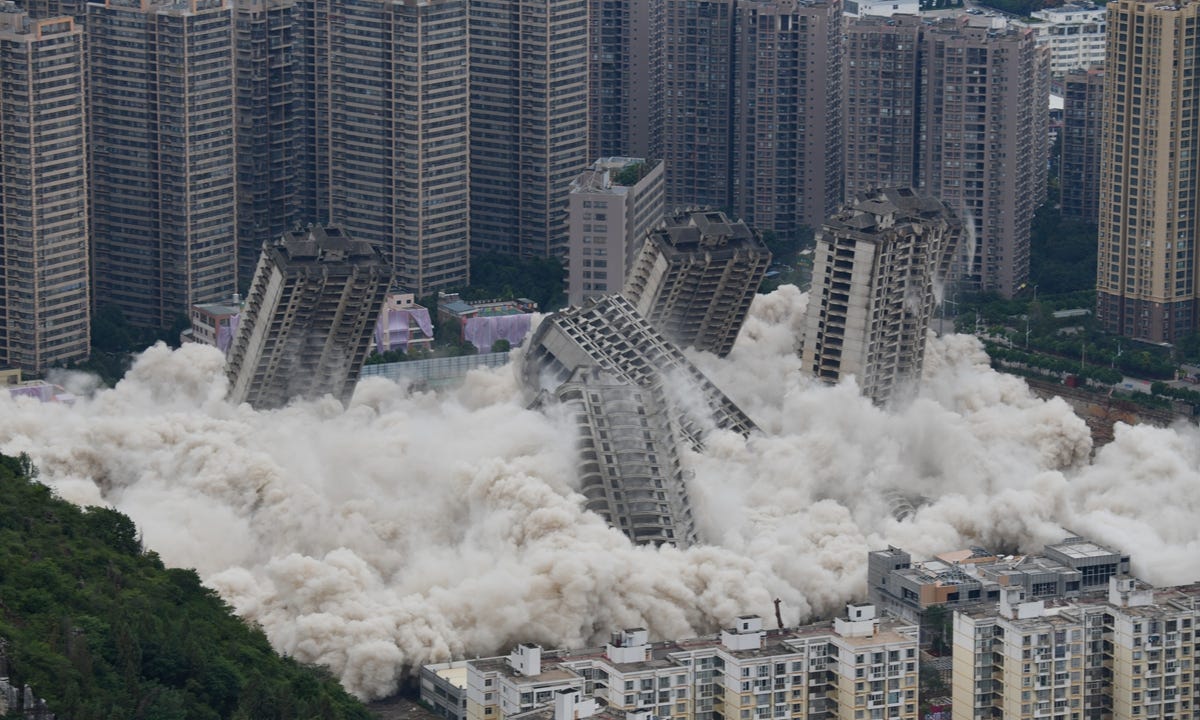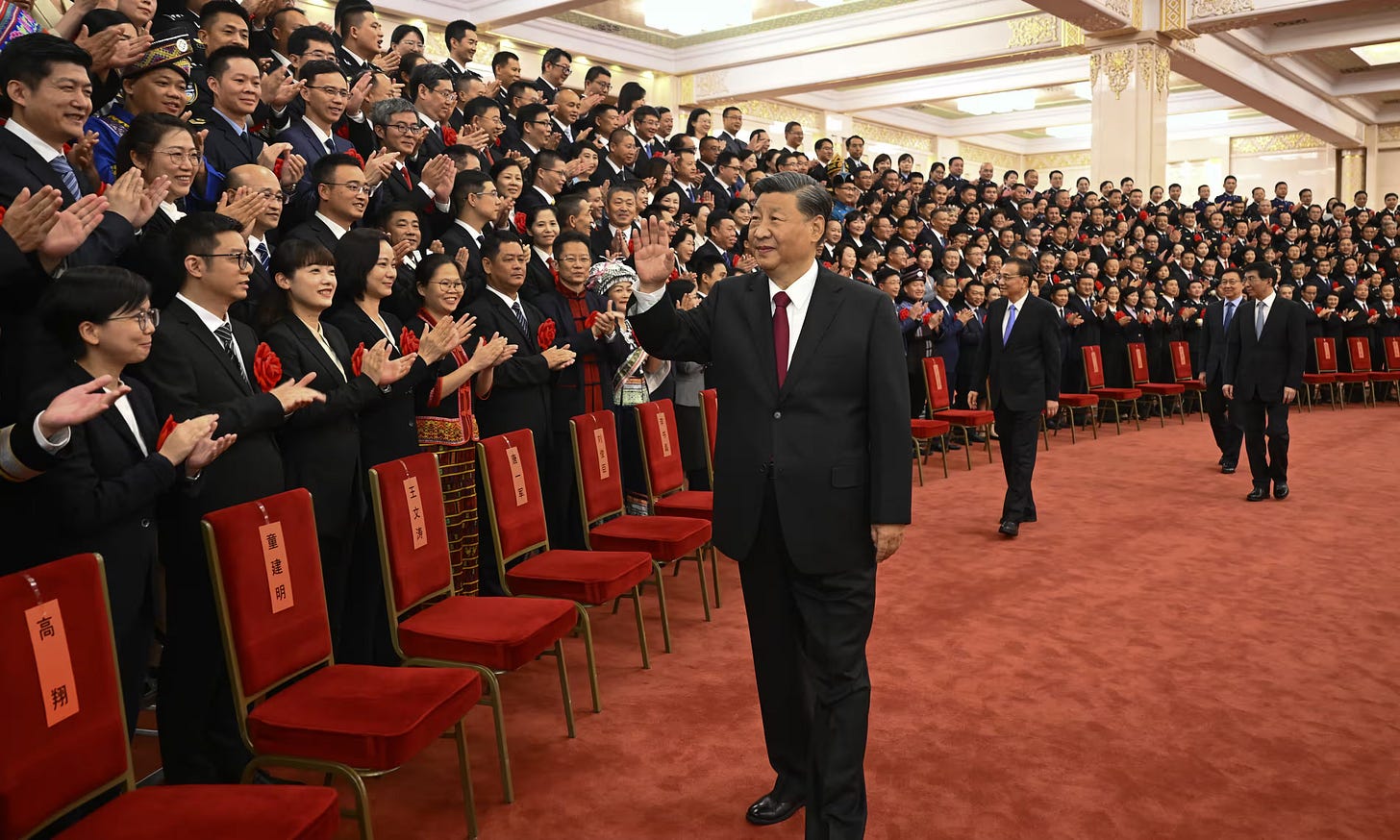Fortress Taiwan: Why a Chinese Invasion is Unlikely, but not Impossible
A possible Chinese invasion of Taiwan looms large on the world stage. However, the enormous risks involved mean that Beijing probably won't take this decision lightly.
Chinese aircraft have become a regular sight over Taiwan in recent years. Image source
On March 22, Taiwan's defense ministry announced that a record number of Chinese aircraft flew over the self-ruled island's airspace. These flyovers are now a way of life, with local children often asking if loud noises they hear are associated with the Chinese military. Recently, Taiwan's top national security official told parliament that, on average, China runs military drills near the island every 7-10 days.
Reunification with Taiwan is a long-held goal for Beijing, with Chinese President Xi Jinping referencing this many times, most recently calling it "inevitable." China's surging military presence in and around Taiwan since 2020 feeds into Taiwanese perceptions that China plans to invade the island soon. U.S. military and intelligence officials provide similar assessments; in 2021, the head of the U.S. Indo-Pacific Command said that a Chinese military attack on Taiwan would be possible by 2027. China's attempts to politically and economically isolate Taiwan are part of an underlying strategy of coercing Taipei into negotiations toward peaceful reunification or, at the very least, ensuring it does not independently assert itself. However, Xi maintains that Beijing reserves the right to use military force to bring Taiwan into the fold.
If China chooses a military approach to reunification, the cost would be enormous to it and the world. Although not outside the realm of possibility, given these costs, Beijing is unlikely to take such a decision lightly.
A daunting prospect militarily
In 1944, the U.S. military deemed an invasion of then-Japanese-occupied Taiwan unfeasible, citing logistical challenges that still hold true today. For China, taking control of the island would require an amphibious assault involving tens of thousands of troops moved across over 80 miles of open sea. Such an operation is only possible two times a year: March through May and over September and October. During the other months, fog, rain, typhoons, high winds, and currents in the Taiwan Strait make the prospect of a full frontal assault practically impossible.
Weather is not the only risk to a potential invading force. Before even reaching the island, Chinese ships transporting troops to Taiwan would be vulnerable to air assaults by Taiwan and possibly its allies, including the U.S. and Japan. According to the Taiwan Relations Act, the U.S. maintains "the capacity to resist any resort to force..that would jeopardize the security" of Taiwan. Although several wargames show that China would likely launch preemptive strikes against U.S. surface ships and air bases, these capabilities would undoubtedly deplete Chinese forces before they even land on Taiwan. Estimates claim that China would lose at least 10% of its invading force in this phase alone.
Should a Chinese invasion force reach Taiwanese shores, the island's terrain poses further significant risks. The 245-mile-long island includes low-lying flatlands in the west, where most of the population lives, becoming more mountainous to the east before dropping off sharply into the Philippine Sea from its steep, craggy east coast. Geographically, the island is almost a miniature mirror image of mainland China, which also has low-lying coastal flatlands and rises to high elevations in its western interior. As such, China could only stage an amphibious assault on Taiwan from an estimated 20 beaches on the island's west coast, the rest of which comprises coastal mud flats with significant tidal ranges. The Taiwanese military regularly conducts defense exercises on these beaches and has done so for many years. Several of these beaches also contain defensive areas, such as cliffs and dense urban infrastructure, that further limit China's landing possibilities. Passive defenses such as mines also pose a significant risk.
Once on land, Chinese forces will face a relatively well-positioned military and a largely hostile population. Taiwan's military includes 169,000 active servicemembers and an estimated 2 million reservists. Taipei's defense spending rose by 5% annually between 2019 and 2023. Moreover, since 2015, Taiwan has purchased advanced weapons systems from the U.S., such as Harpoon missiles, High Mobility Artillery Rocket Systems, and howitzers.
These geographic and military factors would likely cause an invading Chinese force to suffer high casualties. A wargame scenario conducted by the Centre for Strategic and International Studies (CSIS) suggests a horrific outcome for all sides in this conflict. In addition to an estimated loss of 3,200 U.S. troops in three weeks of combat – nearly half the amount killed in two decades of combat in Iraq and Afghanistan – Taiwan's military is also "left to defend a damaged economy on an island without electricity and basic services." However, the study presents an even grimmer outlook for the Chinese invasion force, which it predicts would fail in its effort.
"China also suffers heavily. Its navy is in shambles, the core of its amphibious forces is broken, and tens of thousands of soldiers are prisoners of war," the CSIS study claimed. The study also estimates China would lose an estimated 10,000 troops, 155 combat aircraft, and 138 major ships in this ultimately unsuccessful scenario.
Taiwan’s geographic features give it a major defensive advantage. Image source
Economic fallout too big to ignore
A potential invasion of Taiwan also presents major economic and political costs for Beijing. The greatest of these is the so-called 'Malacca Dilemma,' which refers to the possibility that the U.S. Navy and those of its allies could block the Malacca Strait, thereby cutting China's access to Middle East energy supplies that are essential to its modern economy. In 2023, China imported 11.28 million barrels per day of crude oil, a 10-year high. Nearly 80% of the country's energy imports pass through the Malacca Strait, which, if blocked, would cripple the country's export-driven economy. China is also the world's largest importer of food, much of which comes from European producers such as France, which must also pass through this vital geo-strategic chokepoint.
There is growing evidence that China's economy is undergoing a prolonged downturn. In 2023, China recorded a decline in exports for the first time since 2016 due to sluggish external demand. FDI inflows fell by 82% last year compared to 2022. Most importantly, an ongoing contraction in the country's property market, comprising some 25-30% of the country's gross domestic product (GDP), has no end in sight. Developers nationwide continue to default on their debts, and the full scale of hidden debts is becoming increasingly apparent. This downturn has significant political consequences as local governments struggle to provide essential services due to dwindling land sales that once comprised over 40% of their revenue. Some estimates claim that China has enough vacant homes for 3 billion people: China's aging market of 1.4 billion people could not satisfy this demand moving forward, meaning a collapse in housing prices could be imminent. These factors make a potential invasion of Taiwan even more economically challenging.
A Chinese invasion of Taiwan would also disrupt semiconductor supply chains and those of downstream industries. Taiwan's TSMC produces over 90% of advanced chips globally and more than 60% of the world's semiconductors. Although an invasion could lead to revenue losses of $1.6 trillion for dependent industries worldwide, China would bear significant losses as it remains heavily reliant on foreign semiconductors, with imports of these amounting to over $415 billion in 2022. Even if China successfully took Taiwan's semiconductor industry intact (an unlikely scenario), production would not be possible without foreign inputs from the U.S. and its allies.
Unfinished buildings demolished in Kunming, China after the funding dried up. The ongoing downturn in China’s property market will likely have consequences for years to come. Image source
Potential impact on regime stability
Over the years, President Xi Jinping has consolidated his power through multiple purges of government and military officials while promoting his proteges and associates to senior positions. In 2023 alone, Xi dismissed his defense minister and foreign minister over alleged disciplinary and national security violations. He also removed nine senior military officers from the national legislative body, among other changes to the military's organizational structure.
Despite being secure after sidelining elite rivals, an invasion of Taiwan could change this calculus. Disproportionate economic and personnel losses during an invasion of Taiwan could potentially unite some members of dissident factions within the Chinese Communist Party (CCP). With over 96 million members, the CCP is the world's largest political party and has engaged in factional infighting throughout its existence. Regardless of Xi's efforts to sideline opponents, this still poses a significant threat to his grip on power.
There is also the threat of popular uprising in the event of significant economic shocks or high battlefield losses over a prolonged period. China's decades-long One Child Policy' ensures that entire families are dependent on single individuals, making each potential troop casualty even more devastating to the country's populace. In the Soviet Union, large demonstrations by mothers of soldiers killed during the country's 1979–1989 War in Afghanistan had a significant impact on the country's morale and may have affected public trust in their government. If China faced a prolonged economic crisis and a potential war of attrition over Taiwan, such public displays could be anathema to the regime.
Chinese President Xi Jinping (center) may have sidelined his opponents and solidified control, but threats within the party could re-emerge, threatening his grip on power. Image source
Conclusion
Although the reunification of China is a core strategic priority for the CCP, the enormous and sustained costs of pursuing this militarily likely outweigh the benefits for the regime. For this reason, increased Chinese efforts to prepare for an invasion do not necessarily indicate a greater desire to do so over the next five years. However, the possibility of such a scenario continues to loom large on the world stage.








I've always been extremely puzzled why we even think Xi/China wants to invade Taiwan. I'm well aware of the history (my mother in law is Taiwanese) but Xi didn't outmaneuver Hu Jintao's allies by letting himself be pushed into rash choices by strong emotions. Hell, Xi has more personal reason to hate the CCP for sending him to work camp exile than Chang Kai Shek (sp?).
So let's look at it dispassionately. Of course, China is absolutely opposed to any recognition of Taiwan for both prestige and geopolitical reasons -- something the threats buy them as a kind of compromise response. It's also in the personal interests of authoritarian leaders to have an external military challenge/threat to justify their iron rule. But those both only suggest Xi wants to talk **as if** he might invade Taiwan.
OTOH even a successful invasion of Taiwan seems like it harms Xi. China benefits enormously from the presence of TSMC and other high tech companies in Taiwan. It's a gold mine of technical secrets they can harvest but any invasion will level all the fabs, send the talent fleeing and dry up the western tech transfer. China ends up with substantial casualties, under sanctions with a Taiwanese population that it can't, by rhetoric, treat as non-Han/Chinese but who present a big security threat.
Not to mention that a war is a great way to shake up power structures. A disaster could prompt others to remove Xi, a stunning success risks the creation of a Ceasar -- popular war hero with the allegiance of the military who can now seize power at home.
None of it makes any sense! Every rational consideration makes Taiwan a less appealing target of military intervention than Pakistan (access to Suez/Gulf w/o going through the straight near south china sea), Phillipines, Indonesia or a number of other places.
Ofc one can always get trapped by you rhetoric but Xi seems well in control.
I'm really confused why the article states the island of Taiwan is 13,826 miles long. A quick look at Google Earth shows the farthest points are 236 miles apart, which would indicate the length of the island. Even if we consider the length of the shoreline as what was intended, that number is just over 600 miles. The article did not state territorial area. Not sure how one island can be construed to be 13,826 miles.